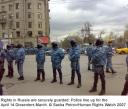Russia will go to the polls for the December 2 parliamentary elections in a deteriorating human rights situation where fundamental freedoms vital to free and fair elections are curtailed.
In the lead-up to these parliamentary elections and the March 2, 2008 presidential elections, authorities are enforcing greater restrictions on protest rallies and tightening controls over civil society, and continue to curb what remains of the independent media. Impunity for serious human rights abuses in Chechnya and the Northern Caucasus persists, and vulnerable groups such as sexual minorities, asylum seekers, migrants, and people living with HIV/AIDS
Russia has made it difficult for international actors to monitor the elections. Three weeks before the elections, the Office for Democratic Institutions and Human Rights of the Organization for Security and Cooperation in Europe (an intergovernmental organization that monitors elections to assess compliance with international standards) announced it would not send monэtors to the elections due to Russia’s stalling on visas and imposition of restrictions on its monitoring mission.
In the weeks before the elections, a leading opposition candidate in Dagestan was shot and killed. According to reports, roughly 150 protesters were detained at a St. Petersburg opposition demonstration, including opposition candidate Boris Nemtsov. And in Moscow, opposition candidate Garry Kasparov was among the protestors detained at a Moscow demonstration.
Chechnya
The armed conflict between Russia and Chechen separatists is drawing to an end, but it leaves in its wake thousands of victims of killings, enforced disappearances, torture, and other human rights violations by parties to the conflict. The Kremlin denies these problems and does almost nothing to hold perpetrators accountable. The European Court of Human Rights has ruled against Russia in 15 cases related to Chechnya to date.
Torture and illegal detention by government forces, including pro-Moscow Chechen forces under the leadership of Chechen President Ramzan Kadyrov, remain widespread and systematic.
Civil Society
Authorities have tightened their grip on the freedom of assembly leading up to the elections and have used excessive force to break up peaceful demonstrations. Moscow city police have announced that they would recruit volunteers from the pro-Kremlin youth group «Nashi» (Ours) to patrol Moscow streets, including at demonstrations and opposition events. Nongovernmental organizations face increased bureaucratic burdens under new legislation, and those working on such controversial issues as Chechnya are targets of administrative and judicial harassment. For example, in August, police seized computers from the Tolerance Foundation, which Human Rights Watch believes is in retaliation for its association with human rights activist Stanislav Dmitrievsky; the following day, an independent newspaper in Nizhni Novgorod was raided.
Freedom of speech continues to be under attack in Russia. Several reporters have suffered physical attacks, criminal prosecution, and persistent harassment. Just one week before the elections, Russian authorities kidnapped, brutally beat, and then released a leading human rights activist and three journalists in Ingushetia. October marked the one-year anniversary of the death of Anna Politkovskaia, a journalist believed by many to have been murdered for her reporting on Chechnya; Ivan Safronov, a retired colonel and military affairs correspondent for the Russian newspaper Kommersant who covered topics such as Chechnya and abuses in the army, was murdered in March 2007.
Vulnerable Groups
Russia undertook a deliberate campaign to detain and expel thousands of Georgians in October and November 2006 during a political crisis between Russia and Georgia. Asylum seekers are at risk of illegal deportation. During violent attacks on LGBT rights activists in May 2007, instead of protecting human rights and gay rights advocates, Moscow police colluded with anti-gay demonstrators to disrupt a gay pride demonstration.
Institutions
The government has not done enough to reform custodial institutions plagued with human rights problems. Thousands of new Russian army recruits face brutal abuse at the hands of senior conscripts. Russian authorities continue to downplay deaths from hazing in the army, blaming abuses on society or the media.
www.hrw.org




